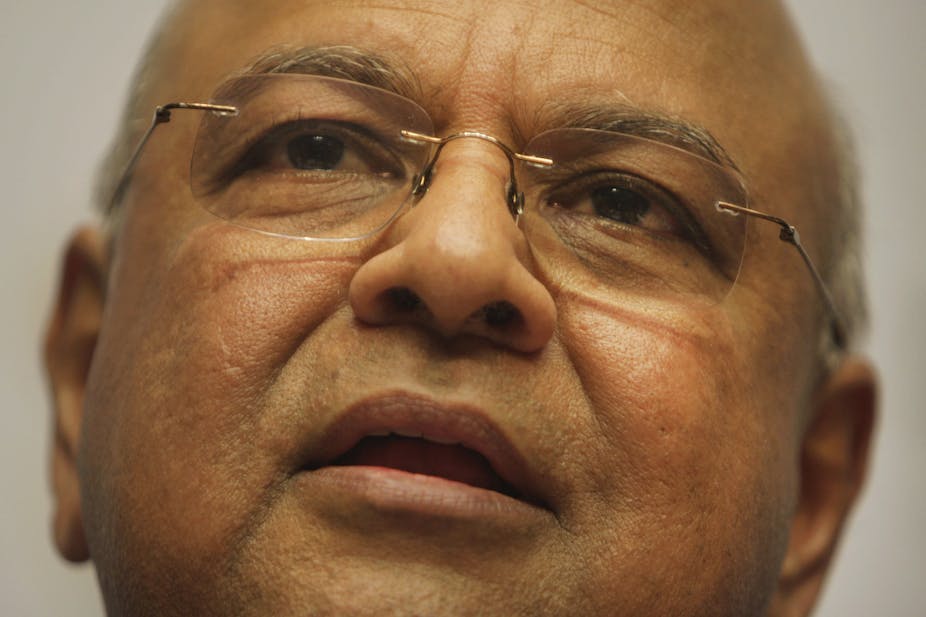Advocate Shaun Abrahams, South Africa’s National Director of Public Prosecutions, has stepped into some torrid waters.
At a recent media briefing he dealt with two issues: the first was his announcement that the National Prosecuting Authority will seek leave to appeal a High Court judgment that the matter of the reinstatement of corruption charges against President Jacob Zuma should be reconsidered. No particular surprise there.
But then the advocate ventured an opinion on a matter unrelated to the Zuma case: recent newspaper articles about the possible arrest of Finance Minister Pravin Gordhan.
A leading Sunday newspaper had reported that the arrest of Gordhan was imminent. The rumoured arrest is on a charge of “espionage” pertaining to an investigative unit established during his period of service as commissioner of the South African Revenue Service.
Gordhan held this position before his initial appointment as minister of finance in 2009. He remained in the post until 2014. Following the crisis precipitated by the removal of Nhlanhla Nene as minister of finance late last year, Gordhan was reappointed in December 2015. This followed the brief but disastrous appointment (from the perspective of the exchange rate) of Des van Rooyen to the finance portfolio.
Abrahams said that comments by certain media, politicians, analysts and economists on matters pertaining to the possible arrest of Gordhan were unhelpful.
But unhelpful for whom?
As an economist, I beg to differ with Abrahams on this matter. The media and public commentators play an important role in pointing out possible dangers to a country’s economy, and when government or politicians err. As members of civil society these commentators are important gate-keepers helping to shape national debate.
Abrahams not only appears to deny this important role and responsibility of commentators in civil society, but he has also clearly misread the public mood and current distrust of government’s actions when these are not clearly explained.
Grave situation
The seriousness of the situation pertaining to the current finance minister was underscored by a statement released by the country’s National Treasury. In it Gordhan is quoted as saying:
The recent media reports about my arrest – imminent or not – have been extremely distressing for my family and me.
He went on to appeal to all South Africans
to protect the National Treasury staff, who have diligently, honestly and skilfully served the national interest to the best of their ability. They are recognised worldwide for their professionalism and competence.
This is indeed what happened after the finance minister’s statement. The media, politicians from different political parties, analysts and economists rallied to his call.
Show of support
I am one of 22 academics from economics and related fields who wrote a letter, published in South Africa’s leading financial daily, Business Day, on Friday 20 May 2016. The purpose of this letter was to show support for the finance minister and the National Treasury in the wake of their call for support. This letter confirms confidence in the minister and the treasury in averting the danger of a possible credit risk downgrade facing South Africa.
The generalised attack by Abrahams on these groups in civil society is therefore completely misplaced and unfounded.
He went further to say:
I call on all concerned … to stop playing with our economy.
Abrahams obviously addresses his comments to the South African public at large, and specifically to the media, politicians, analysts and economists. The only problem is that he misdirects his comments.
The media, politicians from different political parties, analysts and economists indeed support the economy as best as they can. This is illustrated by the fact that, at this point in time, South Africans are generally rallying behind the finance minister and National Treasury.
Abrahams would therefore be well-advised to look elsewhere for those to blame for South Africa’s current economic woes rather than to blame the groups, professions and people identified in his statement. They are merely the messengers.
South Africa still teeters on the edge of a possible credit risk downgrade. Commentators highlighting this danger do so in the interest of averting such a danger, rather than in an attempt to push the country over the edge. Refraining from comment, as Abrahams suggests, would not avert the danger. It would merely hide it from the public eye.

